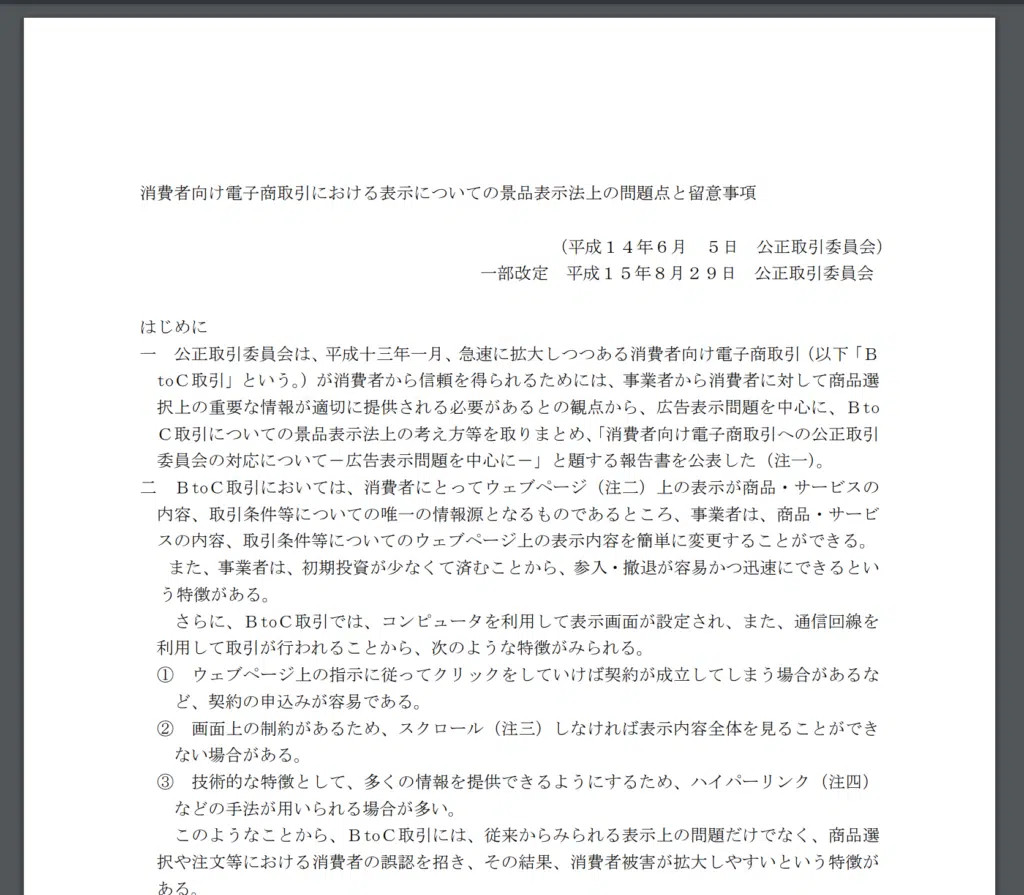Don't Do It! Examples of Exaggerated Advertising and Penalties for Violations

When promoting your own products or services, it’s inevitable that sometimes the descriptions may become exaggerated.
However, false advertising is regulated by law, and if violated, there is a possibility of being penalized.
In this article, we will explain specific examples of false advertising, penalties, and countermeasures for those who are struggling with advertising expressions.
What is Exaggerated Advertising?
Exaggerated advertising refers to advertisements that may lead consumers to misunderstand that the content or price of a product (service) is better than it actually is.
Advertisements, by their nature, are designed to sell products or services, and therefore, they tend to use somewhat exaggerated expressions. However, if these expressions go too far, consumers may not be able to choose the appropriate products or services, and may potentially suffer disadvantages.
For this reason, the Japanese Act against Unjustifiable Premiums and Misleading Representations (Act against Unjustifiable Premiums and Misleading Representations) defines and regulates exaggerated advertising as “misleading representations” to protect the interests of consumers.
Regulations and Specific Examples Based on the Japanese Premiums and Representations Act

The Japanese Premiums and Representations Act defines the following three types of unfair representations:
- Superiority Misrepresentation
- Advantageous Misrepresentation
- Other representations that may mislead consumers
1. What is Superiority Misrepresentation?
“Superiority Misrepresentation” refers to unfair representations about the quality, standards, or other aspects of a product or service.
If a product is represented as being significantly better than it actually is, or falsely represented as being significantly better than a competitor’s product, it falls under the category of Superiority Misrepresentation.
- Labeling a pajama that is not 100% silk as “100% Silk”
- Using synthetic diamonds but labeling the jewelry as “Made with Natural Diamonds”
- Claiming to use a “special ingredient not used by other companies” despite the fact that the same ingredient is used by competitors
The Consumer Affairs Agency requires the submission of documents providing reasonable grounds for the representation when it needs to determine whether it constitutes Superiority Misrepresentation.
If the business operator does not submit the documents within the specified period, or if the submitted documents are not recognized as providing reasonable grounds for the representation, it is deemed to be Superiority Misrepresentation, and a corrective order is issued.
Furthermore, if the business operator cannot refute the claim, they must pay a surcharge.
2. What is Advantageous Misrepresentation?
“Advantageous Misrepresentation” refers to unfair representations about the price of a product or service or other transaction conditions.
This refers to representations that make the actual price or the price compared to competitors’ products appear more advantageous than they actually are.
- Advertising “Half price now!” without stating the original price (when the actual price is not recognized as half price)
- Not disclosing fees that would reduce the interest received on a financial product
- Claiming “double the content of other brands” despite containing only about the same amount as other brands’ products
3. What are Other Representations that May Mislead Consumers?
In addition to the above, the Japanese Premiums and Representations Act defines the following six types of representations that may mislead consumers:
- Unfair representations about non-fruit juice beverages, etc.
- Unfair representations about the country of origin of a product
- Unfair representations about the cost of consumer credit
- Unfair representations about bait advertising for real estate
- Unfair representations about bait advertising
- Unfair representations about paid elderly homes
About Advertisements on the Internet
In the case of advertisements on the Internet, the information displayed on the website is the only source of information about the product or service and transaction conditions for consumers. On the other hand, business operators can easily change the content of the display.
Furthermore, personalityistics of websites, such as the ease of applying for a contract, the need to scroll to view the entire content, and the small font size that makes it easy to overlook important information such as warnings, can lead to misunderstandings in product selection and ordering, and can easily expand consumer damage.
For this reason, the Fair Trade Commission has published “Issues and Points to Note about Representations in Consumer E-commerce under the Premiums and Representations Act” to make business operators aware of the points to note in their representations.
This notice provides detailed guidance on how to display items such as hyperlinks and information update dates. When creating advertisements on the Internet, it is important to understand these points.

Regulations and Cases Based on Other Laws
Advertisements and mail-order sales of health foods such as supplements, pharmaceuticals, and real estate are subject to regulation not only under the Act against Unjustifiable Premiums and Misleading Representations (Japanese Premiums and Representations Act), but also under other laws.
Advertisements for Health Foods such as Supplements

Under the Health Promotion Act (Japanese Health Promotion Act), false and exaggerated representations (representations that significantly contradict the facts or significantly mislead people) are prohibited in advertisements for health foods.
- Claiming that a disease can be cured just by taking the product, despite the fact that medical treatment by a doctor is necessary.
- Claiming that you can lose a certain amount of weight in a month without dieting, without sufficient evidence.
- Presenting testimonials that suggest the health food alone produced results, when in fact other pharmaceuticals were also used.
For specific review criteria on the regulation of health food advertisements, please refer to the Consumer Affairs Agency’s public announcement, “Points to Note under the Act against Unjustifiable Premiums and Misleading Representations and the Health Promotion Act regarding Health Foods“.
For points to be careful about in supplement advertisements, please see the detailed explanation in the following article.
Related article: “What are the Legal Regulations for Supplement Advertisements?“
Advertisements for Pharmaceuticals, Quasi-drugs, Cosmetics, Medical Devices, and Regenerative Medicine Products
Advertisements for pharmaceuticals, cosmetics, etc., are subject to regulation under the Pharmaceuticals and Medical Devices Act (Japanese Pharmaceuticals and Medical Devices Act), and exaggerated advertisements and displays of efficacy and effects outside the approved range are prohibited.
- Displaying “Contains various ingredients!” without specifying the specific ingredients.
- Displaying that it should be used in combination with other pharmaceuticals, despite not being approved.
- Not displaying the conditions that limit the approved efficacy and effects (excluding advertisements for Kampo medicines).
Also, the range of efficacy and effects that can be used in advertisements varies depending on the product, such as cosmetics and quasi-drugs.
For example, in the case of cosmetics, it is stipulated in the Ministry of Health, Labour and Welfare’s public announcement, “Revision of the Range of Efficacy of Cosmetics“, that you cannot display any efficacy other than the 56 specified.
For guidelines on advertising quasi-drugs, please see the detailed explanation in the following article.
Related article: “What are the Guidelines to be Aware of When Advertising Quasi-drugs?“
Real Estate Advertisements
The Building Lots and Buildings Transaction Business Act (Japanese Building Lots and Buildings Transaction Business Act) prohibits transaction business operators from making false and exaggerated advertisements regarding properties, environment, and money.
- Displaying “Excellent location 1 kilometer from the station!” for a property that is 1 kilometer in straight-line distance from the nearest station but 4 kilometers in actual travel distance.
- Displaying “2LDK” for a 1LDK+S (storage room) property.
- Displaying “Many properties with zero brokerage fees!” despite the fact that there are hardly any properties with zero brokerage fees.
Note that bait-and-switch real estate advertisements are listed as “other displays that may mislead consumers” under the Act against Unjustifiable Premiums and Misleading Representations, but they also fall under false and exaggerated advertisements under the Building Lots and Buildings Transaction Business Act and are subject to regulation.
Advertisements for Mail-Order Sales
Advertisements for mail-order sales are subject to regulation under the Act on Specified Commercial Transactions (Japanese Specified Commercial Transactions Act), and false and exaggerated representations by mail-order sales operators are prohibited.
- Displaying “latest model” for a product that is no longer the latest model without specifying the date of data update.
- Displaying “free” in the advertisement on the website, despite the fact that the terms of use clearly state “paid” and a fee is actually incurred.
- Selling imitation products of famous brand bags that are registered trademarks on the Internet without permission.
Note that even if you are using Internet auctions, etc., on a personal basis, if you are selling the same product for profit multiple times, you may be considered a sales operator and subject to regulation under the Specified Commercial Transactions Act.
For detailed criteria on whether or not you fall under “sales operator”, please refer to the Consumer Affairs Agency’s public announcement, “Guidelines on ‘Sales Operators’ in Internet Auctions“.
Penalties for Exaggerated Advertising

Penalties for exaggerated advertising are defined in each law as follows:
Penalties under the Japanese Premiums and Representations Act
If the Consumer Affairs Agency’s investigation finds illegal activities such as unfair representation, it will issue a “corrective order” to:
- Eliminate the misunderstanding caused to the general consumer by the unfair representation
- Implement measures to prevent recurrence
- Not to commit similar violations in the future
If this corrective order is not followed, the business operator’s representative may be sentenced to imprisonment for up to 2 years or a fine of up to 3 million yen, or both. The business operator may be fined up to 300 million yen.
In addition, a surcharge will be imposed on the business operator separately from the above.
The surcharge is equivalent to 3% of the sales during the period of the violation (up to 3 years).
However, you do not need to pay the surcharge if you meet either of the following conditions:
- When it is recognized that the business operator did not know that it falls under the category of superior misrepresentation or advantageous misrepresentation, and did not neglect due care not to know
- When the amount of the surcharge is less than 1.5 million yen (when the sales subject to the surcharge is less than 50 million yen)
Penalties under the Japanese Health Promotion Act
If an advertisement violates the Health Promotion Act and is deemed to have a significant impact on the health maintenance of the public and the transmission of information to the public, a recommendation will be made first.
If you do not follow the recommendation without a valid reason, an order will be issued to take the measures related to the recommendation.
Furthermore, those who violate this order will be sentenced to imprisonment for up to 6 months or a fine of up to 1 million yen.
Note that while only business operators supplying goods or services are subject to the regulations of the Premiums and Representations Act, under the Health Promotion Act, “no one should make false exaggerated representations”, so not only business operators who actually manufacture and sell products, but also advertising agencies, media, service providers, etc. are subject to regulation.
Penalties under the Japanese Pharmaceuticals and Medical Devices Act
If an advertisement is found to violate the Pharmaceuticals and Medical Devices Act, you will be sentenced to imprisonment for up to 2 years or a fine of up to 2 million yen, or both.
In addition, a surcharge system was introduced to the Pharmaceuticals and Medical Devices Act on August 1, 2021. The surcharge is set at 4.5% of the sales during the period of the violation (up to 3 years).
Please note that, like the Health Promotion Act, the Pharmaceuticals and Medical Devices Act also stipulates that “no one should make false exaggerated representations”, so in addition to business operators, advertising agencies, media, service providers, etc. are also included in the regulation.
Penalties under the Japanese Building Lots and Buildings Transaction Business Act
If an advertisement issued by a real estate business operator violates the Building Lots and Buildings Transaction Business Act, you may be subject to an instruction disposition or business suspension disposition.
In addition, in particularly serious cases, you may be subject to a license suspension disposition.
Also, as a criminal penalty, you may be sentenced to imprisonment for up to 6 months or a fine of up to 1 million yen, or both.
Penalties under the Japanese Act on Specified Commercial Transactions
If an advertisement by a mail-order business operator violates the Act on Specified Commercial Transactions, you may be subject to instructions for corrective measures or a business suspension disposition.
Also, you may be fined up to 1 million yen.
Measures to Avoid Exaggerated Advertising

There are three main measures to avoid exaggerated advertising.
Measure ① Thoroughly disseminate information about advertising regulations within the company
The laws regarding advertising regulations vary widely depending on the product and its sales format, making it difficult to determine which law applies.
Prepare a manual within the company that summarizes the products and services subject to the advertising regulations of each law, and unify the judgment criteria.
Measure ② Check the guidelines and precautions of public institutions
Public institutions such as the Consumer Affairs Agency and the Ministry of Health, Labour and Welfare publish precautions that clarify the standards of regulations when operating laws that contain advertising regulations.
These guidelines may also include specific expressions to avoid in advertising, which can be useful when creating an in-house manual.
Measure ③ Consult with experts who are knowledgeable about advertising regulations, such as lawyers
If you lack the specialized knowledge to implement the above measures, it is advisable to consult with experts such as lawyers who are familiar with legal regulations.
If you violate the regulations, you may be subject to severe penalties such as a business suspension order. To avoid damaging the company’s reputation, it is important to consult with experts such as lawyers and prevent trouble as much as possible.
Conclusion: If you’re struggling with exaggerated advertising or the Japanese Premiums and Representations Act, consult a lawyer
Advertising is primarily regulated by the Japanese Premiums and Representations Act, but depending on the type of product or service and the sales method, it may also be subject to various other laws such as the Japanese Health Promotion Act, the Japanese Pharmaceuticals and Medical Devices Act, the Japanese Building Lots and Buildings Transaction Business Act, and the Japanese Specified Commercial Transactions Act.
When placing an advertisement, you must carefully consider what kind of expression constitutes exaggerated advertising.
If you are unsure about the criteria for determining whether or not you are violating regulations, or if you are unsure about the specific expressions you can use in advertising, it is safe to consult with a lawyer who is well-versed in advertising regulations.
Introduction to Our Firm’s Measures
Monolith Law Office is a legal office with high expertise in both IT, particularly the internet, and law. In recent years, violations of the Japanese Pharmaceutical and Medical Device Act (PMD Act) have become a significant issue in areas such as online advertising, and the need for legal checks on advertisements and other materials is increasingly important. Our firm analyzes the legal risks associated with businesses that have already started or are about to start, based on various legal regulations, and strives to legalize them as much as possible without stopping the business. Details are described in the article below.
Areas of practice at Monolith Law Office: Article and Landing Page Checks for the PMD Act and Other Laws





















